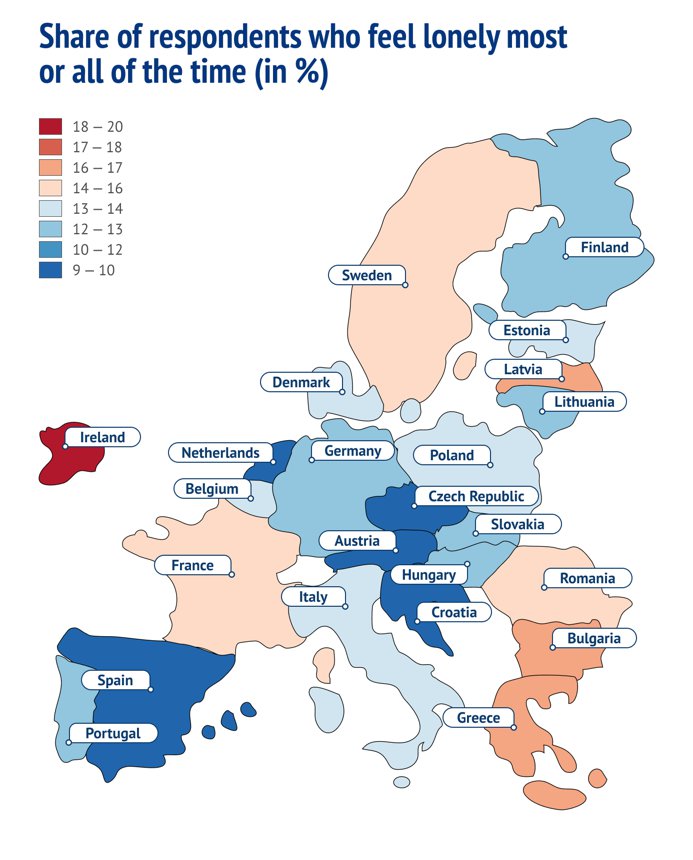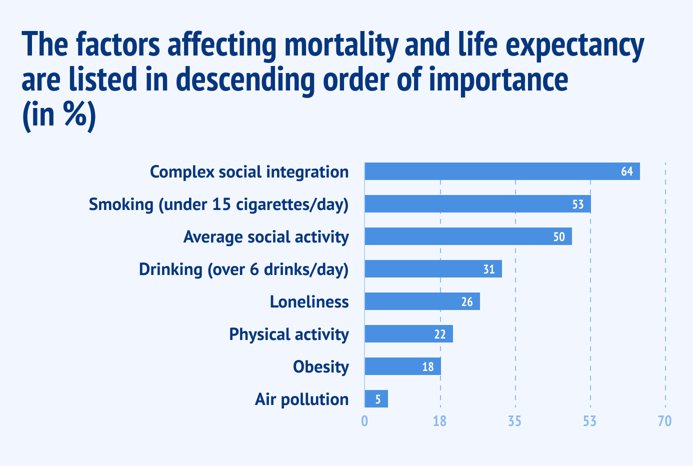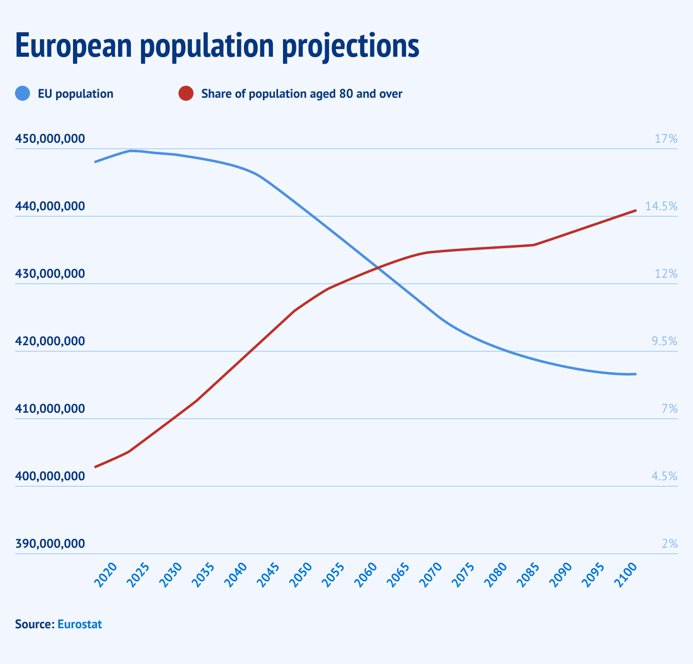Research: The impact of loneliness on quality of life, real estate investment, and the global economy

The pandemic and resulting social isolation have brought attention to the issue of loneliness. These events have demonstrated that loneliness is not only oppressive and devastating but also poses a threat to human health. The World Health Organization (WHO) has addressed the issue, and the European Commission has conducted a separate research on the risks and consequences of loneliness. This article, based on the key findings from scientific research, examines the impact of loneliness on quality of life and the global economy.
According to a major survey conducted by the European Commission in H1 2023, more than 30% of Europeans experience loneliness on a regular basis, with 13% experiencing it for most of their lives. The highest levels of loneliness are reported by residents of Ireland, Luxembourg and Bulgaria.

The causes and extent of loneliness are not yet fully understood, but it is widely accepted that social connections are crucial to human health.
Lonely people are 26% more likely to die prematurely than those who are satisfied with their social lives.
In a study for National Geographic in the 2010s, Dan Buettner identified the characteristics of the so-called «blue zones». These are the corners of the planet where the greatest numbers of centenarians are recorded and where people live healthy and fulfilling lives. Buettner studied the lifestyles of people in Sardinia, Okinawa, Ikaria, and Nicoya. He concluded that key factors include diet, physical activity, stress management, social support and community connectedness.
Susan Pinker’s research in Sardinia, conducted around the same time, showed that social connections and constant interaction with neighbours, friends, and relatives, rather than just the quality of nutrition and physical activity, are crucial for ensuring both the length and quality of life. This is consistent with the findings from the blue zones, where residents have never experienced feelings of loneliness.
Excluding the phenomenon of blue zones, do these findings work for ordinary countries?
Can the blue zones’ experience be applicable to the other countries?
Julianne Holt-Lunstad, a researcher at Brigham Young University, conducted a series of studies on tens of thousands of middle-aged people to determine the greatest factor influencing life expectancy. The research spanning many years has revealed that the presence of close relationships, people who can be relied upon in difficult circumstances, is a key factor affecting mortality and life expectancy.
However, an even more significant factor is social integration, which includes the number of physical contacts made during the day and the number of people greeted or spoken to. Both strong and weak social ties are important.
Social integration was found to be the most significant factor in determining a person’s lifespan.

Loneliness on the Net
Does spending more time on social networks lead to greater social integration? Can we rely on messengers to communicate with friends and family without feeling lonely?
In order to investigate the differences in brain activity between in-person and online interactions, neuroscientist Elizabeth Redcay from the University of Maryland conducted a separate research. By comparing the brain activity of two groups performing the same actions, she found that during face-to-face communication, the brain activates mechanisms responsible for attention and social intelligence. People can experience an emotional reward when they perceive that someone else shares their thoughts, feelings, and actions.
During personal interactions, the brain releases a cascade of neurotransmitters. Simply looking into someone’s eyes or shaking hands can produce oxytocin, which reduces cortisol levels in the blood, and dopamine, which regulates cognitive functions and motivates us. These neurotransmitters can also reward with a pleasant feeling of accomplishment.
These observations demonstrate that investing time and resources in social interactions and friendship can create a powerful biological defence against disease and death. Active social lives have been linked to lower rates of dementia, and women with breast cancer are four times more likely to survive the disease when they have a strong support network. Men who have had a stroke may benefit from regular social contact, such as meeting for poker or coffee, which can provide greater protection than medication alone.
Several European countries have already implemented measures to address loneliness. However, there is currently no unified social programme in the EU.
Meanwhile, local programmes aimed at helping elderly people who feel lonely (particularly the most vulnerable group during the pandemic) are becoming more widespread. France’s largest national programme, MONALISA, brings together approximately 500 local organisations across the country, providing a platform for mutual aid and communication. Similarly, Switzerland’s KISS programme has established several community spaces for single people across the country, helping more than 2,000 people avoid nursing homes.
EU governments are becoming concerned about the prevalence of loneliness, particularly as the ageing population grows. According to Eurostat, the share of people over 65 years of age is projected to increase from the current 20% to 30% of the population by 2050, with those over 80 years of age increasing from 6% to 11%. Currently, Italy, Germany, and Portugal are the countries facing the highest risk due to their ageing populations. However, the impact of this demographic trend is expected to affect Europe as a whole. There is also a trend towards smaller families consisting of two people, which has been observed in 24 out of the 27 countries in the European Union.
Simultaneously, increasing divorce rates and new forms of cohabitation are contributing to a shortage of housing.

New housing models, such as co-living and senior living, are emerging in these circumstances.
These accommodations not only address the housing problem but also enhance quality of life and alleviate loneliness. They foster an environment where social connections can naturally flourish, improving both physical and emotional well-being.
Portugal has untapped potential for this type of accommodation. It is a leading country for retirement and is increasingly being chosen as a holiday destination by older generations from the UK, Germany, France, Scandinavia, and the US.
The demand for housing for older people in Portugal is on the rise due to several factors, including security, a warm climate, a well-established healthcare infrastructure, and tax breaks for non-residents. However, the bureaucratic system and the reluctance of banks to issue loans for such projects prevent Portugal from fully capitalising on this growth in demand for this type of housing construction.
Investment activity is currently concentrated mainly in Germany and the United Kingdom, which together account for over half of the total investment in the industry. However, interest in the sector is gradually spreading throughout Europe, and investment volumes are growing most rapidly in Sweden, Italy, and Spain. The senior housing net yield ranges from 3.3% to 5.8%. The success of co-living projects for older people depends on several key factors, including location, quality of services (especially medical and leisure), and access to public transport.
Currently, amidst economic uncertainty, there is a notable shift from investing in real estate that generates a fixed rental income to investing in operational real estate. This investment type links the income and property value to the performance of the underlying operator. Examples of operational real estate include shared-use projects such as co-living, co-working, student and elderly accommodation, as well as data centres, warehouses, and medical centres. In such projects, investors focus on managing their assets. This can provide inflation protection and a significant boost to profitability in times of market turbulence and uncertainty.
The trend towards an increase in the number of older people who want to live together, communicate with each other and take part in activities together is gaining momentum.
Understanding trends and their underlying reasons is becoming increasingly important. This is not just about material gains, but also about the social, physical, and emotional benefits they bring.
We will send you a content digest not more than once a week
